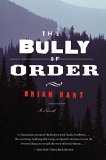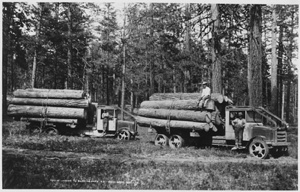Summary | Excerpt | Reviews | Beyond the Book | Read-Alikes | Genres & Themes | Author Bio

Critics' Opinion:
Readers' Opinion:
First Published:
Sep 2014, 400 pages
Paperback:
Sep 2015, 400 pages
 Book Reviewed by:
Book Reviewed by:
Rebecca Foster
Buy This Book
This article relates to The Bully of Order
Timber has been a key industry for Washington state since the Gold Rush of the 1850s. Ponderosa pine, Douglas fir, cedar, spruce, and hemlock trees once filled a tract of land from the Cascade Range to the Pacific Ocean. Seattle and the Puget Sound area provided much of the lumber that was shipped down to California.
 Logging operations were often small, coastal outposts started by a handful of men who banded together to cut down the trees in their area. Sustainable logging was not a concern in those days; profit was the sole consideration. Some lumber yards grew larger, into towns or cities, but often retained a lawless, macho atmosphere, as is the case with the harbor town in Brian Hart's The Bully of Order. Saloons and brothels were two essential establishments.
Logging operations were often small, coastal outposts started by a handful of men who banded together to cut down the trees in their area. Sustainable logging was not a concern in those days; profit was the sole consideration. Some lumber yards grew larger, into towns or cities, but often retained a lawless, macho atmosphere, as is the case with the harbor town in Brian Hart's The Bully of Order. Saloons and brothels were two essential establishments.
A couple of Washington cities – Aberdeen and Hoquiam, both in Grays Harbor county – were particularly known for illegal activity. In one year in the early 1900s, 43 anonymous bodies were found floating in Grays Harbor. Whether shot, poisoned, or pushed in to drown, there was definitely foul play behind the "Floater Fleet." Billy Gohl, a union official for the Sailor's Union of the Pacific, was suspected of having a hand in many of the murders.
Businesses and unions were often at odds with each other. Logging was incredibly risky, with workplace accidents ranging from pulled muscles to dismemberment. Not surprisingly, then, it was one of the first industries to experience labor radicalism. In Portland, Oregon, just across the Columbia River from Washington state, the radical group Industrial Workers of the World (also known as the "Wobblies") closed down all the town's sawmills, vowing not to reopen them until they had achieved collective factory ownership and workers' rights. Many mill owners in Washington feared the IWW's influence.
In 1900 a Minnesotan investor, Frederick Weyerhaeuser, bought 900,000 acres of land from the Northern Pacific railroad, at $6 an acre. His monopoly drove most small mills out of business, but made the entire industry much more efficient. Fortunately, Weyerhaeuser also had a compassionate attitude toward his workers, offering fair payment and worker's compensation for on-the-job injuries.
 Forest fires were a constant threat, sometimes set deliberately in misguided acts of celebration. At times Tacoma and Seattle would be lost in a fog of smoke. The most devastating fire on record, known as the Yacolt Burn, started at Mount St. Helens in 1902 and eventually burned 200,000 acres of forest. Not only were 12 billion board feet of timber destroyed, but at least 30 people lost their lives.
Forest fires were a constant threat, sometimes set deliberately in misguided acts of celebration. At times Tacoma and Seattle would be lost in a fog of smoke. The most devastating fire on record, known as the Yacolt Burn, started at Mount St. Helens in 1902 and eventually burned 200,000 acres of forest. Not only were 12 billion board feet of timber destroyed, but at least 30 people lost their lives.
Incidents like this led to regulation of the logging industry, starting with those initiated by President Theodore Roosevelt and Gifford Pinchot, his friend and chief of the Forest Service. He placed large tracts of forest under federal protection, a first step in ensuring sustainable timber for future generations. In 1938 President Franklin D. Roosevelt oversaw creation of the 922,650-acre Olympic National Park, now a World Heritage site and home to a large herd of elk.
Picture of logging trucks from National Archives and Records Administration
Picture of avalanche lilies in Olympic National Park from National Park Service
Filed under People, Eras & Events
![]() This "beyond the book article" relates to The Bully of Order. It originally ran in November 2014 and has been updated for the
September 2015 paperback edition.
Go to magazine.
This "beyond the book article" relates to The Bully of Order. It originally ran in November 2014 and has been updated for the
September 2015 paperback edition.
Go to magazine.





The House on Biscayne Bay
by Chanel Cleeton
As death stalks a gothic mansion in Miami, the lives of two women intertwine as the past and present collide.

The Flower Sisters
by Michelle Collins Anderson
From the new Fannie Flagg of the Ozarks, a richly-woven story of family, forgiveness, and reinvention.

The Funeral Cryer by Wenyan Lu
Debut novelist Wenyan Lu brings us this witty yet profound story about one woman's midlife reawakening in contemporary rural China.
Your guide toexceptional books
BookBrowse seeks out and recommends the best in contemporary fiction and nonfiction—books that not only engage and entertain but also deepen our understanding of ourselves and the world around us.